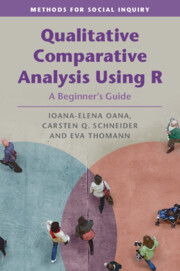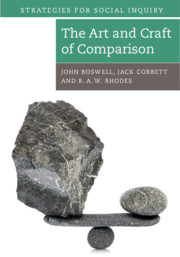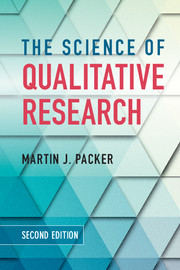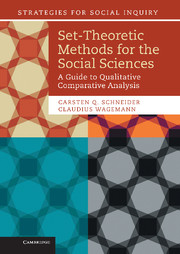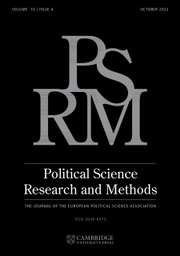Qualitative Comparative Analysis Using R
A Beginner's Guide
Part of Methods for Social Inquiry
- Authors:
- Ioana-Elena Oana, European University Institute, Florence
- Carsten Q. Schneider, Central European University, Budapest
- Eva Thomann, Universität Konstanz, Germany
- Date Published: January 2022
- availability: Available
- format: Paperback
- isbn: 9781009009935
Paperback
Other available formats:
Hardback, eBook
Looking for an inspection copy?
This title is not currently available for inspection. However, if you are interested in the title for your course we can consider offering an inspection copy. To register your interest please contact [email protected] providing details of the course you are teaching.
-
A comprehensive introduction and teaching resource for state-of-the-art Qualitative Comparative Analysis (QCA) using R software. This guide facilitates the efficient teaching, independent learning, and use of QCA with the best available software, reducing the time and effort required when encountering not just the logic of a new method, but also new software. With its applied and practical focus, the book offers a genuinely simple and intuitive resource for implementing the most complete protocol of QCA. To make the lives of students, teachers, researchers, and practitioners as easy as possible, the book includes learning goals, core points, empirical examples, and tips for good practices. The freely available online material provides a rich body of additional resources to aid users in their learning process. Beyond performing core analyses with the R package QCA, the book also facilitates a close integration with the R package SetMethods allowing for a host of additional protocols for building a more solid and well-rounded QCA.
Read more- Introduces both basic and advanced features of state-of-the-art QCA and their implementation in the most advanced software environment
- Integrates conceptual and empirical examples and datasets from a wide range of social science disciplines
- Provides a rich body of freely available additional online resources including scripts, datasets, templates, test questions and exercises with solutions, and a basic introduction to R
- Is tightly connected to the functionalities of R packages QCA and SetMethods
Reviews & endorsements
In a relatively short, clear, and well-written textbook, the authors cover all the essentials of QCA. It includes all the current practices and developments that one needs to do a complete QCA analysis. I am using it in my QCA class and I think the students will like it. Gary Goertz, Kroc Institute for International Peace Studies, University of Notre Dame
See more reviewsThis book is simply a must for anyone aiming at exploiting 'hands on' the distinctive analytic leverage of QCA, via the vast possibilities of the R environment. Benoît Rihoux, University of Louvain and COMPASSS global network (compasss.org)
Every now and then, a book comes along of which you think 'why wasn't this around when I was learning this stuff?'. Because sometimes, you just want to learn from the best. The authors have written an excellent guide for both first-time users and experienced QCA scholars: robust, powerful, and a must-read. Bart Cambré, Antwerp Management School
Easily accessible and loaded with a wealth of examples, this important book by Oana, Schneider, and Thomann provides an expert guide to the set-analytic perspective. The integration of concepts and research strategies with the R software package makes their approach particularly successful. I expect it will quickly become the standard introduction to QCA. Peer C. Fiss, University of Southern California
Social scientists interested in QCA should not miss this book. Oana, Schneider, and Thomann offer an introduction to QCA that is friendly, up to date, and technically advanced. The volume covers set relations, calibration of “crisp” and “fuzzy” sets, necessary conditions, sufficient configurations, temporality, advanced diagnostics, and post-QCA tools. Each chapter contains intuitive examples, advanced tips, and detailed implementation instructions in R. Aníbal Pérez-Liñán , University of Notre Dame
Customer reviews
Not yet reviewed
Be the first to review
Review was not posted due to profanity
×Product details
- Date Published: January 2022
- format: Paperback
- isbn: 9781009009935
- length: 180 pages
- dimensions: 229 x 154 x 14 mm
- weight: 0.37kg
- contains: 63 b/w illus. 26 tables
- availability: Available
Table of Contents
Part I. Getting started: Introduction: QCA in a nutshell
Part II. Before the analytic moment:
2. Calibrating and combining sets
Part III. During the analytic moment:
3. Necessary conditions
4. Sufficient conditions
Part IV. After the analytic moment:
5. Rounding up solid a QCA
6. Post-QCA tools
7. Summary and outlook.
Sorry, this resource is locked
Please register or sign in to request access. If you are having problems accessing these resources please email [email protected]
Register Sign in» Proceed
You are now leaving the Cambridge University Press website. Your eBook purchase and download will be completed by our partner www.ebooks.com. Please see the permission section of the www.ebooks.com catalogue page for details of the print & copy limits on our eBooks.
Continue ×Are you sure you want to delete your account?
This cannot be undone.
Thank you for your feedback which will help us improve our service.
If you requested a response, we will make sure to get back to you shortly.
×
